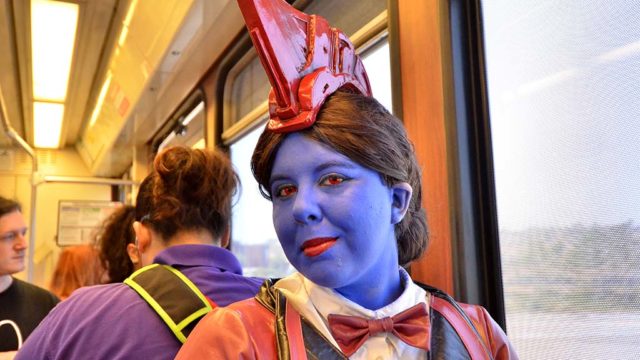
By Chris Stone
Times of San Diego
Megan Eisenzimmer of National City wakes up at 6 a.m., and for the next three hours prepares her transformation into Guardians of the Galaxy’s Yondu with a Mary Poppins twist.
Psychology professor Travis Langley of Arkansas’ Henderson State University appears at a Comic-Con panel. Photo by Chris StoneWith San Diego Comic-Con under way, cosplayers like Eisenzimmer come out of their shells.
Eisenzimmer sat on a trolley bound for the San Diego Convention Center and talked about the metamorphosis of people who dress up and assume the identity of a sci-fi or fantasy figure.
“You dress up as a character that you connect with, see their struggles, see their interests and you’re able to connect with that,” said the 21-year-old.
But it’s much more than what is visible to the eye, she said. Beyond the costumes, it’s about the inner transformation that takes place once someone becomes part of the “community.”
“Once they are part of cosplay, they feel natural. People feel accepted,” said Eisenzimmer, who talked about her experiences and those of her friends.
Eisenzimmer thinks escapism plays a big part in the interest in cosplay. People have personal problems and through cosplay are able to escape from a community that they don’t feel accepted in, she said.
“It’s a good system to learn about self love because you embrace yourself as a person because the community is so supportive and loving of the people behind the costume,” the cosplayer said.
Like Eisenzimmer, Todd Schmidt of San Diego said he loves to see the excitement on people’s faces as they react to his fantasy appearance.
“It’s actually [a] small community,” he said. “I’ve met friends from other countries. I just love to dress up. It’s not just the costume. It’s a lot of passion, time and effort. We’re a big family.”
At Comic-Con, costumes become an invitation to conversation that can lead to get-togethers and photo taking sessions throughout the year.
Eisenzimmer sees a sense of family between members who hang out and create friendships.
“You realize you’re not alone,” she said. “Because of the love and support of the community, you start to love and accept yourself.”
Young people are an anxious bunch, she says, but when they find the embrace of the cosplay community, “they come out of their shells.” She said she used to feel very self-conscious, but no longer feels embarrassed about dressing up.
One of the biggest misconceptions about cosplay is that it’s a useless endeavor, she said.
“People think it’s a waste of time, but it’s a hobby that requires a lot of talent,” Eisenzimmer said, adding that she has become more proficient as a seamstress as her costumes have become more challenging over the years. (Someone once asked her to quickly make a costume for them. Eisenzimmer declined.)
Travis Langley, who regularly makes presentations on the psychology of superheroes, said in an interview Thursday that cosplay shares the appeal of a certain late October holiday – and it’s not just about the costume.
“Halloween is about the fun of it and being part of a community experience when others are out there doing it too,” said the tenured professor of psychology at Henderson State University in Arkansas. “It’s not about the costume; it’s that other people are doing it.”
Cosplay is a community, he said — “a connection, for some [it’s] about pulling together.”
“In cosplay, you are often celebrating a character that is meaningful and interesting to you or character that you think you have the right look for,” said Langley, who has a regular column in Psychology Today called “Beyond Heroes and Villains.”
The convention environment is all about connecting with other people, said Langley, who has a doctorate in experimental social psychology and has written a series of popular-culture psychology books.
Langley notes that most people at Comic-Con don’t take part in cosplay — saying the media depiction of costumed attendees gives the impression that far more people are cosplaying than really are.
“But everyone has the option to be part of the show,” Langley said. “Most don’t, but they know that they have the option. And that’s meaningful.”
The Henderson State professor since 1994 thinks Comic-Con provides an environment that celebrates interests of those who feel ostracized elsewhere in their lives.
Unike Eisenzummer, Langley doesn’t see the element of escapism. Rather, “it’s an unleashing something that is part of themselves,” said Langley, who once dressed up as “Darth Megan” — a melding of “Star Wars” and “Walking Dead Max” characters. “When you are wearing that costume, you are not escaping. You are letting part of yourself out there for people to see.”
Langley — who again is taking part in Comic-Con panels — said the biggest misconception about cosplay is the fear of “What if they get lost in this costume … and think they are this character?”
He responds: “How many actors playing Hamlet forgot that they really weren’t Hamlet? People think they might lose touch with reality with this. I don’t see signs of this.”
Eisenzimmer thinks there has been much more understanding and acceptance of cosplay in the past 10 years.
“There’s no age limit,” she said. “I’ve seen older ladies dress up as Tweety Bird’s owner. It’s not gender specific. The motto is: You can cosplay anything you want.”
*
Stone is a staff member of The Times of San Diego, which shares stories with San Diego Jewish World under the aegis of the San Diego Online News Association.